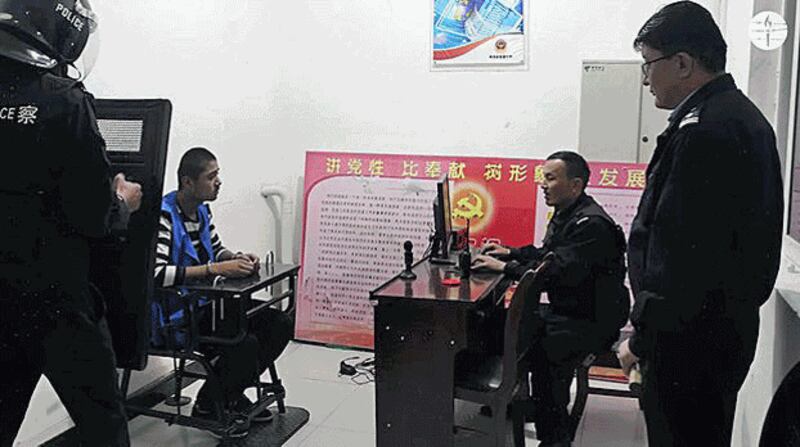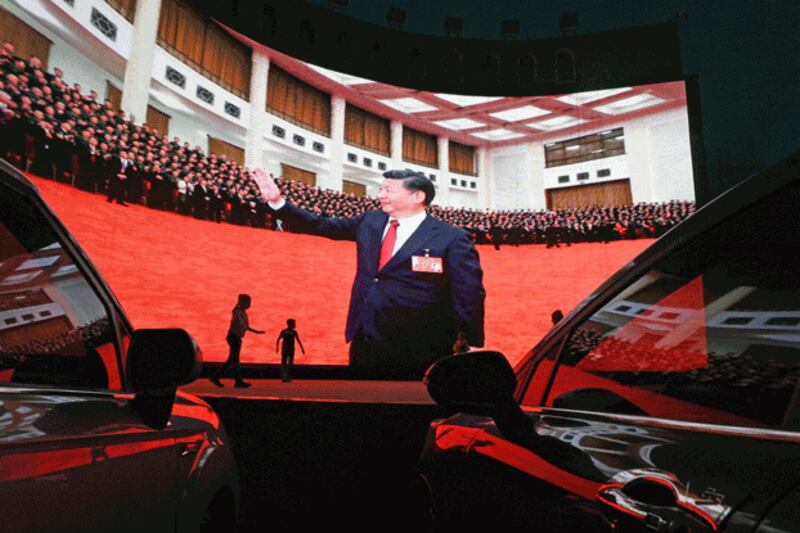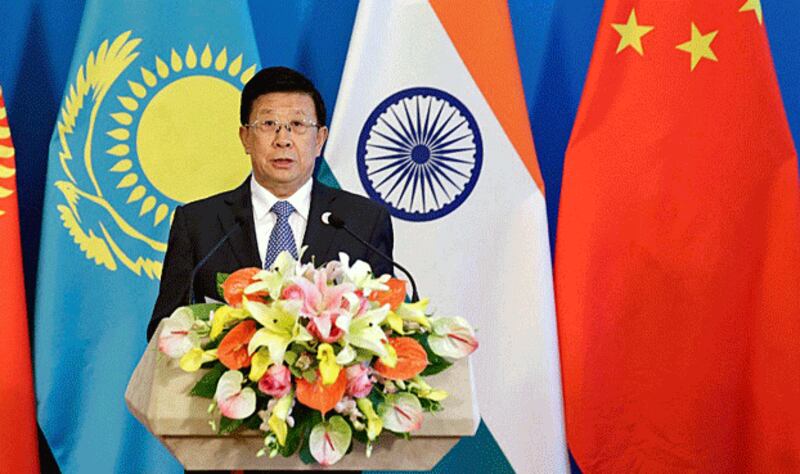Classified speeches given by high-ranking Chinese Communist Party officials describe Uyghurs and other Muslims as an “enemy class” whose traditions must be wiped away for China to survive, startling new evidence of the coordinated brutality authorities have deployed to force restive minority groups to assimilate.
The speeches are part of a trove of documents known as the Xinjiang Police Files, leaked records allegedly from internment camps in the Xinjiang Uyghur Autonomous Region (XUAR) that were released in May by German researcher Adrian Zenz, an expert on the region. The files contain information about more than 20,000 detained Uyghurs.
The internal-party speeches, labeled “classified documents,” show that Chinese government officials carefully planned what the United States and the parliaments of some western countries have said is genocide and crimes against humanity.
Among the documents is a May 2017 speech by Chen Quanguo, Chinese Communist Party secretary of the XUAR from August 2016 to December 2021, who said the Chinese government’s crackdown in Xinjiang was not an act of stamping out criminals but rather an “extinction war” aimed at the Uyghur population. He called the Uyghurs an “enemy class.”
Chen described a “strike hard” campaign strategy of governing Xinjiang that was directed by the Chinese President Xi Jinping and included the imprisonment of Uyghurs.
According to the files, Chen’s instructions in his speech were based on directives received from China’s central government.
Rights groups have issued reams of credible, well-documented reports about the detention of an estimated 1.8 million Uyghurs and other Turkic minorities in the XUAR, along with widespread surveillance, discrimination, restrictions on culture and freedom of religion that the groups face, and severe rights abuses, including torture, sexual assaults, and forced labor.
Chen also said that those sentenced to fewer than five years in prison should be mobilized for “learning law” and “bilingual learning,” and be released only after they reached a satisfactory study level no matter how many years it took.
The former official said Uyghurs deemed untrustworthy or harmful by the Chinese government had to be educated to the extent that they were committed to “completely freeing themselves from such ideas once they return to society.”
But those whose outlooks could not likely be changed — “unauthorized imams” and “two-faced people” — should be detained or imprisoned indefinitely because they have the ability to guide the Uyghur community. The Chinese Communist Party uses the term “two-faced” to describe people — usually officials or party members — who are either corrupt or ideologically disloyal to the party.

‘Poisoned by terrorism, violence and extremism’
The “harmful” people Chen Quanguo mentioned in his speech refers to Uyghurs the Chinese government considers to be “poisoned by terrorism, violence and extremism” or during contacts with foreigners. Chen said such people needed to be “treated” in what he called a “people’s war.”
Information in the Xinjiang Police Files and other research reports and leaked documents suggest that what Chen referred to as poison included Uyghur traditions and Islamic activities.
Speeches by Chen and Zhao Kezhi, the former Chinese minister of public security, indicated that there were millions of “poisoned” Uyghurs.
Adrian Zenz, who received the Xinjiang Police Files from an unnamed source, said Chinese authorities have detained Uyghurs not for crimes, but for their social connections.
“[M]any of more than 2,800 people we have seen in the Xinjiang Police Files were detained because of their social networks, not because of any crime they committed,” he said.
Ilshat Hassan Kokbore, a political analyst based in the U.S. and vice chairman of the executive committee of the World Uyghur Congress, said the large-scale arbitrary detention of Uyghurs by the Chinese government and what Chen describes as a “people’s war” are tantamount to publicly declaring the entire Uyghur people is the “enemy of the Chinese state.”
Another focal point of Chen’s speech was the extension of government control over Uyghur families. In his view, police could visit and monitor only a limited number of households under what authorities called the “10 Families, One Ring” policy, creating a loophole in the surveillance of those who did not live in the vicinity of a police station.
In late 2017, Xinjiang authorities assigned cadres to visit and stay in the homes of Uyghurs, where they ate with the residents and in some cases slept in their beds, in what was a test-run of the “Pair Up and Becoming Family” program. Under the program, public servants were assigned to families and had to live with them in their houses for a few days every couple of months to monitor them.
Chen summed up the situation at the time: “In the past, in some villages, our officials were afraid of being killed when entering their families to become relatives. Now the officials who enter the families are greeted by everyone at the dinner table.”

‘Eliminating budding risk’
As far as Uyghur children were concerned, Chen said 1 million minors being educated in “bilingual" kindergartens had learned the “national language” very well.
In just a few months it was possible for the children to sing the national anthem in Chinese and to love the “great motherland,” Beijing and Tiananmen Square, Chen said.
“Only in this way can we make the next generation hopeful for long-term stability, follow the party and be grateful to the party,” Chen said, without mentioning where the parents of the Uyghur children were or what they thought.
The Chinese state educating such a large number of Uyghur children would be devastating to Uyghur society, Kokbore said.
The Chinese government’s education methods are driven by the notion of “eliminating budding risk,” so that the scale of the training continues until this danger is eliminated, Zenz said.
The leaked files contain another address by Chen to county-level Chinese officials in the XUAR on June 18, 2018. His speech was followed by a visit by then-Chinese Minister of Public Security Zhao Kezhi, who went to the region to inspect the camps while giving general instructions on how to continue the “Xinjiang work.”
Chen’s speech repeatedly refers to the “Xi Jinping-led Chinese Communist Party’s strategy of governing Xinjiang.” He said Zhao conveyed Xi’s instructions and demands during his inspection, saying that “the most important and leading task in Xinjiang is to achieve social harmony and long-term stability.”
The XUAR government had to meet the demands laid out by Xi Jinping, no matter the cost, Chen said, emphasizing that the region’s political situation was the key holding the entire country together.
Increasing the XUAR’s gross domestic product, or becoming a “heroic model” in economic development, was a secondary or tertiary priority, Chen said.

‘10 Works’
Chen then repeated that the guiding principle of “everything is for the main goal” had to be the “permanent theme” for the governance of Xinjiang.
While on his inspection tour, Zhao said in his address that the “10 Works” had been carried out well, namely the “strike hard” campaign against “violent terrorism” launched in May 2014, the eradication of “extremism,” and the “cutting off the four” — Uyghur lineage, roots, sources and contacts.
Also among the completed “10 Works” he cited were the deployment of Chinese public servants in Uyghur households, popularization of national language education from kindergarten to college, transformation through education, construction of the Integrated Joint Operations Platform —the main system for mass surveillance in the region — and the expansion of the Xinjiang Production and Construction Corps, a state-owned economic and paramilitary organization also known as Bingtuan, to the XUAR’s south, where the majority of Uyghurs live.
Zhao said CCP General Secretary Xi Jinping’s “hopes were fully met. The five-year plan has been fully accomplished.”
Speaking about the five-year plan, Chen went on to say that 2018 would be a year of consolidation.
“We will upgrade these measures to the ‘regularization’ phase over the next five years,” he said. “From then on, we will continue to strike in this direction, even when stability is achieved. If I stay in Xinjiang for 10 years, I will not let it go for a minute, so we will do this from top to bottom without losing any of our vigilance.”
Repeating Zhao’s “assessment conclusion,” Chen announced that the crackdown against the Uyghurs that began in 2013 was by 2018 a complete “victory.”
But he added that separatist, pan-Turkist and pan-Islamist forces in Xinjiang were “still provocative.”
“We cannot relax from looking at our current victory,” he said. “This struggle of ours will never stop like the separatists thought it would. Some separatists are hiding in the current crackdown and are dreaming of reemerging if the situation becomes a little softer than before. This is a daydream they have. This hard strike of ours will not go away for a minute from now on. Our struggle, which has been achieved for five years, will continue in the next five years in the form of ‘strike hard.’”
In his June 2018 speech, Chen also said the “anti-separatist struggle in Xinjiang is long-term, complex, sharp, at times even extremely fierce; in a sense, this can also be said to be the eternal theme of Xinjiang.”
Translated by RFA Uyghur. Written in English by Roseanne Gerin.
